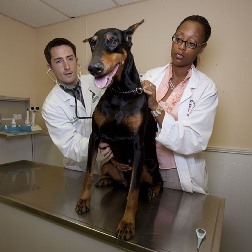How to Enroll In a Veterinary Assistant School in Florida
 Achieving your lifelong dream of working with and helping pets by enrolling in a vet college in Florida might initially feel like a challenging endeavor. After all, you have to find and enroll in a school that will provide the appropriate training so that you can be successful as a veterinary assistant, technician or technologist. But just how do you tackle assessing and comparing schools so that you can make the ideal selection? Many potential students begin their due diligence process by looking for colleges that are near their residences. Once they have identified some area colleges, they find out which ones have the cheapest tuition and hone in on those. Although location and cost are significant factors when comparing vet tech schools, they are not the only important ones when making your comparisons. Qualifiers such as internship programs and accreditation should be looked into also. The main idea is that there are questions you need to be asking the veterinary tech programs you are looking at before you make a final selection. We have presented several in this article in order to help get you started, but before we review them we’ll talk about the different responsibilities of veterinary techs and assistants and the training alternatives available.
Achieving your lifelong dream of working with and helping pets by enrolling in a vet college in Florida might initially feel like a challenging endeavor. After all, you have to find and enroll in a school that will provide the appropriate training so that you can be successful as a veterinary assistant, technician or technologist. But just how do you tackle assessing and comparing schools so that you can make the ideal selection? Many potential students begin their due diligence process by looking for colleges that are near their residences. Once they have identified some area colleges, they find out which ones have the cheapest tuition and hone in on those. Although location and cost are significant factors when comparing vet tech schools, they are not the only important ones when making your comparisons. Qualifiers such as internship programs and accreditation should be looked into also. The main idea is that there are questions you need to be asking the veterinary tech programs you are looking at before you make a final selection. We have presented several in this article in order to help get you started, but before we review them we’ll talk about the different responsibilities of veterinary techs and assistants and the training alternatives available.
The Function of a Veterinary Tech and Assistant
 Among the initial decisions that you will need to make is whether you plan to train as a veterinary assistant, technologist or technician. Part of your decision might be predicated on the amount of time and money that you have to commit to your training, but the main determiner will probably be which specialization appeals to you the most. What vet techs and assistants share in common is that they both work under the immediate guidance of a licensed and practicing veterinarian. And although there are a number of functions that they can carry out within the Florida veterinary clinic or hospital, they can’t prescribe medications, diagnose conditions, or conduct surgeries. In those areas they may only furnish support to a licensed veterinarian. There are technicians and technologists that work exclusive of the conventional veterinarian practice, such as for zoos, animal shelters or police departments. Let’s take a look at the responsibilities and training prerequisites for each specialization.
Among the initial decisions that you will need to make is whether you plan to train as a veterinary assistant, technologist or technician. Part of your decision might be predicated on the amount of time and money that you have to commit to your training, but the main determiner will probably be which specialization appeals to you the most. What vet techs and assistants share in common is that they both work under the immediate guidance of a licensed and practicing veterinarian. And although there are a number of functions that they can carry out within the Florida veterinary clinic or hospital, they can’t prescribe medications, diagnose conditions, or conduct surgeries. In those areas they may only furnish support to a licensed veterinarian. There are technicians and technologists that work exclusive of the conventional veterinarian practice, such as for zoos, animal shelters or police departments. Let’s take a look at the responsibilities and training prerequisites for each specialization.
- Vet Assistants in most instances will have completed a structured training program, either as an apprentice or intern in a practice, or by graduating from a certificate program at a community college or trade school in Florida. As the name implies, their job function is to assist the veterinarians and vet techs in the completion of their duties. Generally they are not involved with more complicated tasks, for example assisting with surgeries. A few of their typical responsibilities may include working at the front desk, preparing and cleaning examination rooms and equipment, or controlling animals during examinations.
- Vet Technicians go through more advanced training compared to assistants and usually earn a two year Associate Degree, ideally from an American Veterinary Medical Association (AVMA) accredited program. They are in a fashion the veterinary equivalent of medical nurses, since their fundamental job duty is to assist vets with diagnosing and treating animal patients. Where they differ from vet assistants is that they are engaged in more complex tasks, for example assisting with surgical procedures or providing medicine. All states presently mandate that vet technicians pass a credentialing examination for either certification, registration or licensing.
- Vet Technologists are similar to vet technicians and basically perform the same job functions. They are mandated to obtain a Bachelor’s Degree in veterinary technology, which typically takes four years. Therefore the only real difference between a vet technician and a technologist is the technologist’s more advanced level of education. But with an advanced degree comes more work opportunities, higher salaries and potential management positions. They are additionally mandated to pass a credentialing exam for either licensing, registration or certification.
Vet technicians and technologists can specialize in areas such as anesthesia, internal medicine or urgent care. A number may acquire certification from the American Association for Laboratory Animal Science (AALAS) to work in laboratories or Florida research facilities also.
Veterinary Online Schools
 An approach that may be a solution for those with a busy schedule or who are working full time while attending veterinarian college is to enroll in an online training program. Since the classes are offered by means of the internet, students can study on their own schedule wherever a computer is available. The course of study is taught using multiple methods, including videos, slide shows and live streaming webinars. And since the majority of vet technician and technologist degrees require practical training, that segment can usually be completed as an internship or work study program at a local Florida veterinary practice or hospital. Distance learning, as it is also called, may in some instances decrease the cost of your education. Tuition and ancillary expenses, for example for traveling and study materials, may be lower compared to more traditional classroom programs. Just confirm that the online school that you choose is accredited, either by the AVMA or another nationally certified accrediting agency. With the online courses and the clinical training, everything is included for a complete education. So if you are dedicated enough to learn in this more self-reliant manner, an online vet tech or assistant program may be the right choice for you.
An approach that may be a solution for those with a busy schedule or who are working full time while attending veterinarian college is to enroll in an online training program. Since the classes are offered by means of the internet, students can study on their own schedule wherever a computer is available. The course of study is taught using multiple methods, including videos, slide shows and live streaming webinars. And since the majority of vet technician and technologist degrees require practical training, that segment can usually be completed as an internship or work study program at a local Florida veterinary practice or hospital. Distance learning, as it is also called, may in some instances decrease the cost of your education. Tuition and ancillary expenses, for example for traveling and study materials, may be lower compared to more traditional classroom programs. Just confirm that the online school that you choose is accredited, either by the AVMA or another nationally certified accrediting agency. With the online courses and the clinical training, everything is included for a complete education. So if you are dedicated enough to learn in this more self-reliant manner, an online vet tech or assistant program may be the right choice for you.
What to Ask Veterinary Assistant and Technician Programs
 At this point you probably have determined which veterinary credential that you wish to earn, and if you intend to study online or attend a program on campus. Since there are an abundance of veterinarian community colleges, vocational and trade schools in Florida and across the USA, you must ask some relevant questions in order to narrow down your list of options. As we discussed in our introduction, many future students start by concentrating on location and tuition expense. But we have already pointed out other significant qualifiers, such as accreditation and internship programs. And obviously you need to choose a college that offers the degree and specialty that you are interested in. These and other factors are addressed in the checklist of questions that you should ask the vet technician and assistant programs that you are reveiwing.
At this point you probably have determined which veterinary credential that you wish to earn, and if you intend to study online or attend a program on campus. Since there are an abundance of veterinarian community colleges, vocational and trade schools in Florida and across the USA, you must ask some relevant questions in order to narrow down your list of options. As we discussed in our introduction, many future students start by concentrating on location and tuition expense. But we have already pointed out other significant qualifiers, such as accreditation and internship programs. And obviously you need to choose a college that offers the degree and specialty that you are interested in. These and other factors are addressed in the checklist of questions that you should ask the vet technician and assistant programs that you are reveiwing.
Is the Veterinary School Accredited? It’s imperative that you confirm that the veterinary tech or assistant college you choose is accredited by a regional or national accrediting agency. As previously mentioned, among the most highly respected is the American Veterinary Medical Association (AVMA). Vocational schools and colleges that are accredited by the AVMA have undergone a demanding review process that confirms you will receive a superior education. Also, accreditation is essential if you are requesting a student loan or financial aid, since numerous programs are not available for non-accredited schools. Last, having a degree or certificate from an accredited program is often a precondition for employment for a number of Florida veterinary clinics and hospitals.
What is the College’s Reputation? The vet trade school or college and program you choose should have an outstanding reputation within the veterinary community. You can initiate your due diligence by asking the colleges you are interested in for references from the employers in their job placement network. Other suggestions include looking on internet school ranking websites and checking with the school’s accrediting organizations as well. You can ask the Florida school licensing department if there have been any complaints or violations involving your specific schools. As a final pointer, call some veterinarians that you may want to work for after you receive your training. Ask what they think about your school choices. They might even recommend some colleges not on your list.
Are Internships Offered? The best means to get clinical hands on experience as a vet technician or assistant is to work in a medical environment. Ask if the colleges you are looking at have internship programs established with regional veterinarians, vet hospitals or practices. Almost all veterinary medicine programs require clinical training and a large number furnish it by way of internships. Not only will the experience be valuable as far as the clinical training, but an internship can also help develop relationships in the local Florida vet community and assist in the search for employment after graduation.
Is Job Assistance Provided? Finding a job after graduating from a veterinary tech or assistant college can be difficult without the help of a job placement program. First, ask what the graduation rates are for the schools you are reviewing. A low rate might signify that the instructors were unqualified to teach the curriculum or that a number of students were dissatisfied with the program and dropped out. Next, confirm that the schools have a job placement program and ask what their placement rates are. A higher placement rate may mean that the Florida college has an excellent reputation within the veterinarian community and has a significant network of contacts for student placements. A lower rate may signify that the training is not highly regarded by employers or that the job placement program is ineffective at placing students.
How Big are the Classes? If the classes are larger, you most likely will get little or no individualized instruction from the teachers. Find out from the Florida colleges you are looking at what their classroom teacher to student ratios are. You may also want to sit in on a couple of classes (if practical) to observe the interaction between teachers and students. Get evaluations from students concerning the quality of instruction. Also, speak with the teachers and determine what their qualifications are as well as their approaches to teaching.
Where is the College Located? Yes, we previously discussed location, but there are a couple of more points to consider on the subject. If you are planning to commute to your vet technician classes from home or work, you have to confirm that the driving time fits into your schedule. For example, driving during the weekend to investigate the route won’t be the same as the commute during rush hour traffic, particularly if the Florida campus is located near or in a larger city. In addition, if you do opt to attend a school in another state or even outside of your County of residence, there may be increased tuition charges particularly for community and state colleges. Of course attending classes online might be an option that will provide you with more flexibility and reduce the need for travel.
Do the Classes Fit Your Schedule? And last, it’s important that you ascertain if the Florida veterinary programs you are evaluating offer class times that are sufficiently flexible to fit your schedule. For example, many students continue to work full time and can only go to classes on the weekends or in the evenings. Others may only be able to go to class in the morning or later in the afternoon. Make sure that the class times you need are offered before enrolling. In addition, determine if you can make up classes that you might miss due to work, sickness or family responsibilities. You may discover that an online college is the ideal solution to fit your vet education into your busy life.
Choose the Best Veterinary Assistant College in Florida
Enrolling in the appropriate veterinary assistant or tech program is a critical first step to beginning a rewarding career providing care and treatment for pets and livestock. Students considering vet tech or assistant programs need to make their selection based on multiple key factors. Vet techs, assistants and technologists are employed in vet clinics, animal hospitals and animal shelters. They commonly take on administrative tasks and support the veterinarian with the animals as needed. As we have covered, it’s essential that you decide on a veterinary medicine program that is both accredited and has an outstanding reputation within the profession. This applies to online vet tech colleges as well. By asking the questions included in our checklist for reviewing schools, you will be able to reduce your choices so that you can make your final decision. And by picking the best school, you can reach your goal of becoming a vet technician, assistant or technologist.
